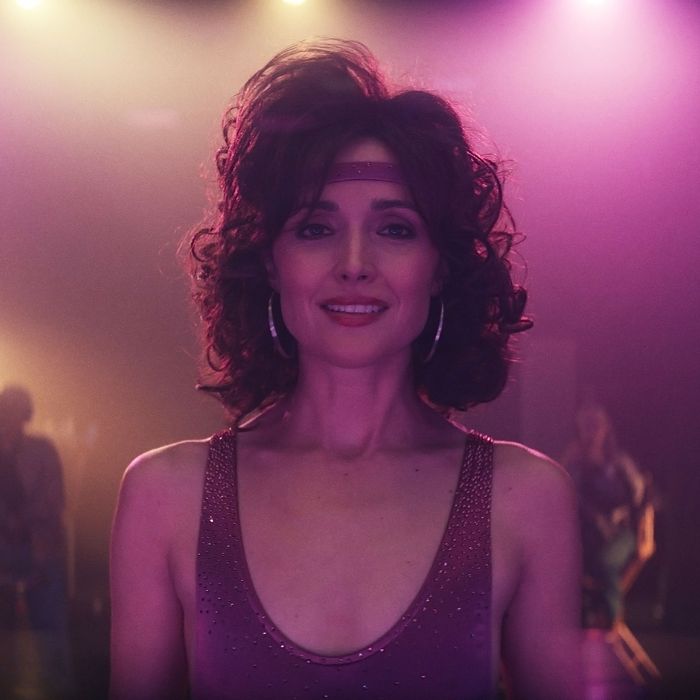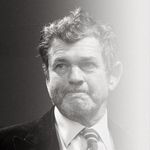
From a brief glance at Physical — at the title, at the half-hour run time, at the glitzy, soft-focus neon art full of shiny spandex and hair permed to high heaven — it could be easy to misread. The Rose Byrne–starring series (which premieres its first three episodes this Friday on Apple TV+, followed by a weekly rollout of the remaining seven) is packaged like a comedy and full of funny potential, especially given Byrne’s too rarely used comedic chops. Here, she plays the role of disaffected early-’80s housewife Sheila Rubin opposite actor and stand-up comedian Rory Scovel. The show is about a woman discovering the pleasure and the potential of aerobics, and that too seems ripe for lighthearted laughs. Perhaps it would be a successor to GLOW, another crack at the boom of women’s arrival in the TV sports-and-fitness industry.
Appearances are so often deceiving, though, which is as true for Physical as for the characters who inhabit the series. Physical will not give you the fun, empowering workout-montage scene that may seem indispensable to this genre. It’s not full of cute jabs at sexism, costume shenanigans, or transformative moments of enlightened, exercise-fueled revelation. Most significant, it is deliberately, almost flagrantly difficult to spend time with its protagonist, and it is impossible to escape her. Especially in the opening few episodes, Physical is driven by the omnipresent, oppressive loop of Sheila’s self-loathing inner monologue, which we receive through a disruptive voice-over that never, ever quits. There’s a wide gulf between the kind of show Physical may appear to be and its reality, but it’s nowhere near as gaping as the space between Sheila’s external life and the maw of despair in her mind.
Sheila and her husband, David, live in San Diego, where David is perilously close to losing his job as a leftist college professor and Sheila — lonely, aimless, and depressed — tries to maintain the all-important external impression that everything is fine. She takes care of their preschool-age daughter, pulls off dinner parties, and tries to buoy her husband’s fragile ego, and all the while, her mind spits out nightmares. “You filthy bitch,” she thinks, dipping her finger into some sample honey at the supermarket. “You didn’t even walk today, let alone run or do ballet, and now look at you. Disgusting, sticky, might as well just give up.” She tastes some honey again and begins shoveling it into her mouth, quickly ceding to what she and the audience by now know is inevitable. She swings by a fast-food place, checks into a motel and then binges and purges, grabbing at some sense of control. “Tomorrow, I will eat clean, healthy food,” Sheila tells herself afterward. “I will find a new dance class. I will have a nice day.” The self-affirmation hurts almost more than the vitriol.
It’s a challenging place for Physical to begin and not just because viewers are sliced up by Sheila’s lacerating inner voice at every turn. Physical may have the run time of a small, relatively contained series (ten half-hour episodes), but it has aspirations beyond just Sheila. As the story develops, Physical sprawls out more like a prestige drama, slowly collecting a passel of other unhappy misfits, each Sheila-esque in the distance between their outer selves and their inner lives. The show doesn’t plunge us into their voice-over mental monologues the way it does with Sheila’s, but by the end of the season, Physical is aiming at a big, burly Meaningfulness. Everyone is disaffected. The system is broken. It’s a problem with Sheila, but it’s also a problem with capitalism, man. (Some of the side characters are California surfer bums, and Physical’s sneering delight in their surfy linguistics provides some of the only pleasant, funny stuff in the show.)
Sheila’s oppressive inner voice is deliberate — of course, it is. Physical’s whole aim is to depict exactly how unbearable intrusive, self-harming thoughts can be. But the challenge is not just that the experience of that voice is so awful. It’s that Physical wants to be so much more, to so many more characters, and it struggles to negotiate the transition between Sheila’s barbed internal world and the lives of everyone else. No one else is as real; no one else has as much agency or space to grow. And because Sheila looks at them all with such disdain, including her husband but also her friend Greta (Dierdre Friel) and her aerobics partner Bunny (Della Saba), the show can’t get away from that sense of disdain either. Sheila hates them but is stuck with them, and the show is stuck with Sheila so we’re all stuck with them too.
There are gestures at all kinds of bigger things throughout Physical. It’s a show that would love to be about Reaganism, the rise of the American mall, sexual kinkery, bipartisan political bloviating, a Californian obsession with luxury and authenticity and the self. Most tellingly, Physical also seems like a show that would love to be about aerobics at least some of the time, the way a group aerobics class can feel like a church, the way it feeds Sheila’s disease even as it soothes her need for control. But it falls short here, just as it falls short in essentially every element of its thematic interests beyond the intense, pathological depiction of Sheila’s bulimia.
Maybe it shouldn’t be a surprise that Physical succeeds so well on a superficial level — spandex, such beautiful spandex — but then struggles with all the material straining underneath. It is a shame, though. And even saying that feels bad because Physical already has so much shame to go around and so little sense of how to anchor it to anything other than white-hot loathing. It’s painful to add more shame to the pile, but Physical is nothing if not a testament to bottomless bad feelings.





